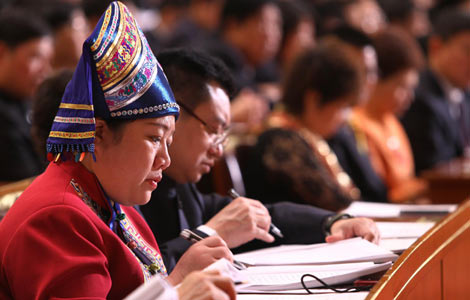 |
|
|
|
|||||||||||
Commerce minister says latest vote is Washington 'pointing fingers'
Trade measures passed by the US Congress violated both US laws and World Trade Organization rules, Chen Deming, minister of commerce, said on Wednesday.
The US House of Representatives passed a measure on Tuesday confirming that the Commerce Department could impose higher duties on goods from China for, they claimed, subsidizing exports. The Senate passed it on Monday.
At a press briefing during the National People's Congress, Chen said that the government had been "abiding by" WTO rules in terms of subsidies.
"The US always likes to point a finger at China and say 'China is not abiding by the rules' when its own economy is encountering problems," Chen said. But it seldom elaborates exactly what rules are being broken, he added.
His remarks followed the 370-39 vote in the House of Representatives in favor of the bill to impose countervailing duties on goods.
The bill was in response to a ruling by the US Court of Appeals for the Federal Circuit last December that stated that US countervailing duty law, (imposing trade penalties) cannot be applied to what it described as "non-market economies".
The legislation will now be passed to US President Barack Obama to sign.
"Such behavior is not in line with international trade rules, nor is it in line with American law," Chen said.
The government, according to Chen, has not provided any subsidies that "are prohibited by the global trade arbitrator", and "we are willing to consult with the US on the issue, if there are any problematic subsidies by local governments," he said.
Chinese trade experts said that the US is merely politicizing the issue as it is considered a vote-getter during election year.
The US has pumped large funds into, and subsidized, many of its domestic industries since the onset of the financial crisis in 2008 but China has not criticized this or launched investigations, Chen said.
Those nations blaming others for subsidies should correct their own behavior, Chen said.
"There is a Chinese saying: Do not impose onto others what you would not like imposed onto you."
The US Commerce Department has levied $5 billion in countervailing duties on Chinese imports since 2006 involving a wide range of industries, including tires, steel, aluminum, paper and chemicals.
Sun Zhenyu, China's former ambassador to the WTO, said an appeal must be considered.
"It's hard to predict, but China must appeal to the WTO if the bill is eventually signed by Obama. China must be tough on the issue."
Some American organizations voiced opposition to the bill. The Club for Growth, an anti-tax advocacy group based in Washington, said that "these duties restrict economic liberty and are anti-growth". They had called on Congress to defeat the measure.
Trade war?
Many are concerned about the outlook for China-US trade relations.
Obama signed an executive order last month setting up a trade enforcement team to make sure that nations play, according to the White House, by the rules. Experts said the team will primarily target China and this will lead to growing trade friction.
"We have noticed it and we are also willing to communicate with it. But we are concerned about whether it will act in accordance with WTO rules and whether it will operate in an open and transparent way," Chen said.
Sun agreed. "China should be on alert. Protectionist measures by the US against China are expected to surge this year."
The Obama administration has filed five cases at the WTO since taking office against China.
The US Commerce Department announced last year that it would launch anti-dumping and subsidy investigations into Chinese solar-panel makers and exports. Investigations were also launched on wind tower manufacturers from China and Vietnam.
"China-US economic and trade relations are the most important part of China's international relations and they benefit people in both countries," Chen said.
"You shouldn't challenge this fact. If you do, you might stumble."
You may contact the writer at dingqingfen@chinadaily.com.cn
Wu Ying, iPad, Jeremy Lin, Valentine's Day, Real Name, Whitney Houston, Syria,Iranian issue, Sanyan tourism, Giving birth in Hong Kong, Cadmium spill, housing policy

|

|

|

|

|

|